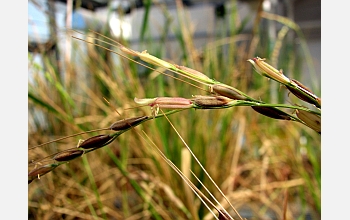According to this article in the Harare Herald, the Kellogg Foundation will be supporting research by University of Zimbabwe scientists into “wild and famine plant foods, their preparation and preservation (and) nutrient analysis … to enhance livelihood security.”
What does Africa need (or want?)
On the one hand, you’ve got your Bill and Melinda Gates Foundation pumping money into two international agricultural research centres to improve the yield of drought-stressed maize. On the other, you’ve got your ungrateful African civil society organisations declaring that these efforts and others like them “under-represent the real achievements in productivity through traditional methods, and will fail to address the real causes of hunger in Africa”. The truth, obviously, lies somewhere in-between. Is it too sappy to expect the Gates money to flow at least partly into researching traditional methods and agricultural biodiversity? Is it too sappy to expect the civil society organisations to curb their knee-jerk reaction against all modern science and economics?
Still, at least the Gates Foundations isn’t DuPont, telling the World Economic forum of the importance of private-public partnerships (code, I think, for government-subsidized research) to promote hybrid seeds.
Singular stories
We get used to reading about massive great projects involving loads of stakeholders with mountains of milestones. And we get jaded. But sometimes solutions are much smaller and with them comes a sense of uplift and possibilities. I got that when I found a post from a woman called Juliana, who is a Peace Corps volunteer in Mali. Her big push is for a millet grinding machine. Here’s why:
This machine grounds the millet the women spend so long to pound everyday. It can also ground peanuts into peanut butter and shea nuts to extract their oil. Mali is one of the leading producers of Shea butter so I’d like to help contribute to it’s production in my village.
If I get this machine it will allow the women much needed free time to do other things during the day. Plus one part of getting the machine is the ‘alphabetisation’ of the women. They need to learn how to read and write so that they can keep proper records for the machine. An NGO will take part in helping to provide the education for the women and the training for record keeping. It’s a good way of introducing literacy into a small village.
And she writes about trialling different kinds of millet in the village.
Bioversity International (my day job) has helped to introduce millet mini-mills in India, and the positive repercussions have been phenomenal. Not to blow my own horn too loudly, but you can hear about the mini-mill here, and there’s an accompanying article in New Agriculturalist.
So, Juliana, if you’re reading this, go for it, and let us know how you get on.
US$14 million for genome studies
 The National Science Foundation in the US has announced grants totaling US$14 million for genome studies of “economically important plants”. Among the many projects will be one on red rice (seen left, photo courtesy of Washington University St Louis), a weedy variant that contaminates rice fields in the US. It reduces yields by up to 80% and researchers hope to discover whether it originated from cultivated rice or was imported, possibly accidentally, as a weed from Asia. A similar study will focus on weedy versions of radish. This could lead to a deeper understanding of just what makes some populations weedy and invasiveness, and hence to better control. One the other hand, maybe they should just develop a local market for red rice.
The National Science Foundation in the US has announced grants totaling US$14 million for genome studies of “economically important plants”. Among the many projects will be one on red rice (seen left, photo courtesy of Washington University St Louis), a weedy variant that contaminates rice fields in the US. It reduces yields by up to 80% and researchers hope to discover whether it originated from cultivated rice or was imported, possibly accidentally, as a weed from Asia. A similar study will focus on weedy versions of radish. This could lead to a deeper understanding of just what makes some populations weedy and invasiveness, and hence to better control. One the other hand, maybe they should just develop a local market for red rice.
Other studies will look at genetic variation within cultivars of maize and pine trees and at the evolution of Brassicas, a highly diverse group. One can only hope that the information gathered will also help farmers and scientists to produce better adapted varieties for their own conditions, even if those conditions are far removed from the intensive agricultural fields of the US.
Borlaug Fellowships announced
Hurry on over to the USDA’s web site to see whether you qualify for one of the Norman E. Borlaug Fellowships, which “help developing countries strengthen sustainable agricultural practices by providing short-term scientific training and collaborative research opportunities to visiting researchers, policymakers and university faculty while they work with a mentor”. thn, let us know when you get one.